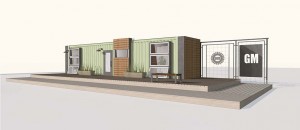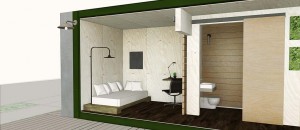
General Motors is collaborating with the Michigan Urban Farming Initiative to build affordable housing out of old shipping containers
General Motors is lending a hand to an innovative initiative to turn used shipping containers into new homes.
The project is part of an effort launched by the fledgling nonprofit, the Michigan Urban Farming Initiative, or MUFI, which hopes to find ways to reuse abandoned land in the Motor City. But the concept of recycling used shipping containers could find broader applications as part of widespread efforts around the country to create affordable housing.
The skilled union personnel at GM’s Detroit-Hamtramck Assembly Plant are taking the lead in the project, helping build the city’s first occupied shipping container homestead. The home will be constructed of 85% rap materials donated by the automaker and built in part by employee volunteers. The project is in collaboration with Detroit-based TAKD Design and the Integrity Building Group of Detroit. The project has also received a small grant from the GM Foundation.

Shipping containers from General Motors' Detroit Hamtramck Assembly plant are being used to produce simple, affordable homes in Detroit.
“This innovative project allows our facility to give back even more and be an integrated community partner while reusing materials that would otherwise be discarded,” said Doneen McDowell, the Detroit-Hamtramck plant manager. “MUFI’s plan to reinvent urban agriculture is a creative approach that helps Detroit’s renaissance,” added McDowell, who said she and her family have volunteered at MUFI’s urban farm.
Darin McLeskey, MUFI co-founder and vice president, said there have been several proposals to re-purpose shipping containers around Detroit, including one that would turn them into a boutique hotel. However, the North End project, which will also make use of the existing urban infrastructure, is the first to get off the ground thanks to help from GM, he said.
The project also envisions reusing the foundation of a demolished or soon to be demolished structure, he said. Detroit has ramped up efforts to tear down unused – and often burned or vandalized – buildings, as many as 8,000 slated to go over the next several years.
The container home will be about 40 feet long, eight feet wide and 10 feet tall. When completed this spring, it will feature 320 square feet of living space with two bedrooms, a bathroom and kitchen. TAKD Design has prepared a specific layout for the building, which could be occupied by a graduate student, who would serve as the resident caretaker for MUFI’s urban farm stead.
The Integrity Building Group developed the build plans and will oversee construction.
McLesky said one of the objectives of the project is to demonstrate the effectiveness of repurposed materials on dwellings oriented toward urban agriculture.
(Ford aims to build interest in work vans with new Transit. For more, Click Here.)
GM donated much of the building materials, which are recycled from scrap at various plants in Michigan and New York State. Some of the repurposed materials include: a Chevrolet Volt battery case that will be reused as bird houses and planter boxes, sound-deadening vehicle insulation which will insulate walls, and old lockers that will be used as planter boxes and for tool storage.
(Click Here to get details of the bigger-than-expected taxpayer hit for GM’s bailout.)
The materials will also be used for some of the furniture designed for the homestead, according to Colin Tury of TAKD Design.
“The home really started as a long-term vision, McLesky said. “We hope this project serves as a source of inspiration and demonstration for many other similar housing types throughout the city.”
(To see University of Michigan expanding its commitment to connected car research, Click Here.)
GM spokesman Dave Darovitz said the maker generally reuses shipping containers. But over time, like any tool or machine, the big metal containers tend to wear out and are retired, making them available for other applications.
A number of homes around the country are now being built using old shipping containers, and while some efforts focus on low-income housing alternatives, the big metal boxes are also being repurposed into some expensive housing, as well, usually involving a number of old containers in a single project.

The US Armed Forces have been using ‘CHU’s for years. Containerized Housing Units. A once what was shipping container has a door cut near the center, a hole large enough for what would be a ‘window unit’ air conditioner and you now have a two or four person ‘home’.
This isn’t rocket science – you make with what you have in time of need…